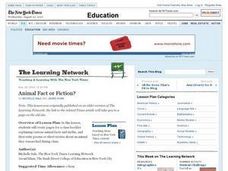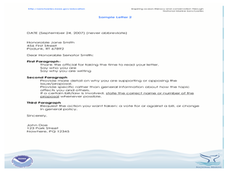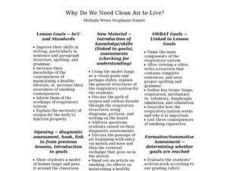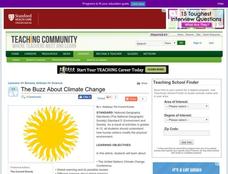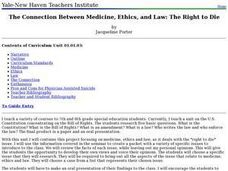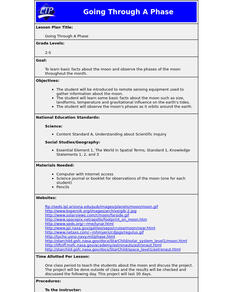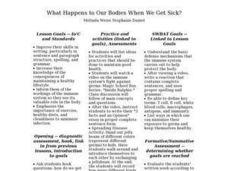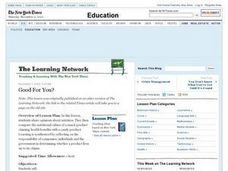Curated OER
Fact vs. Opinion: Theory, Hypothesis, and Bias
Emphasize the differences between a theory and a hypothesis to teach your class how to avoid scientific bias.
Curated OER
Animal Fact or Fiction?
Read and discuss the article "Welcome to Cicadaville (Enter at Your Own Risk)" to gain a better understanding around the confusion regarding cicadas and locust swarms. In groups your young analysts research statements about animals to...
Curated OER
In My Opinion
Young writers craft letters to the government stating their opinion on different topics. They pick an environmental or ocean issue, research it, and craft their formal persuasive letter. Ensure your learners include supporting facts and...
Curated OER
Don't Let the Earth Down
Writing a persuasive argument starts with a clear thesis. Using this resource, your class will write a persuasive paper on a conservation issue. They will then transform their argument into a 30-second public service announcement. If...
Curated OER
Leap! Frog!
Students write a report stating facts and opinions based on frogs. Investigate and understand the changes that take place during the life cycle of a frog. Respond to language, meanings and ideas in different texts, relating them to...
Curated OER
Why Do We Need Clean Air to Live? - Biology Teaching Thesis
Students name the main components of the respiratory system. They write a reaction that contains complete sentences, and uses proper spelling and grammar, after viewing a video. Students define the following terms: lungs, respiration,...
Curated OER
Keeping Your Heart in Good Shape: What are the Benefits? - Biology Teaching Thesis
Students name the main parts of the heart and what events occur there. They write a reaction that contains complete sentences, and uses proper spelling and grammar, after viewing a video. Students define the following terms: contraction,...
Curated OER
Powers of Persuasion
Did you know that clothing and textiles can be recycled, just like glass, paper, aluminum, and plastic? Pupils are introduced to textile recycling and design persuasive posters or letters that raise awareness about this unique...
Curated OER
Teaching Students About Chernobyl and Nuclear Energy
On the 25th anniversary of the Chernobyl disaster, students can learn about nuclear energy and the challenges its use poses.
EngageNY
TASC Transition Curriculum: Workshop 12
How can opinions slant facts? Workshop participants learn how to examine primary and secondary sources and identify the author's point of view. They also examine how visual art impacts the meaning and rhetoric of sources. Full of...
Curated OER
Climate Change
Young scholars discuss global warming. In this global warming lesson, students read an article about global warming and list five things they learned. Young scholars work in small groups to compare what they wrote. Students illustrate...
New York State Education Department
TASC Transition Curriculum: Workshop 11
You'll C-E-R a difference in classroom achievement after using a helpful instructional activity. Designed for economics, civics, government, and US history classes, participants practice using the CER model to craft arguments about...
Curated OER
The Connection Between Medicine, Ethics, and Law: The Right to Die
Learners in a special education class examine the United States Constitution. Using the text, they answer five research questions and discuss the amendments that concern medicine, ethics and law of the right to die issue. They develop...
Curated OER
Science Current Events Lessons
You can use current events to increase student understanding of both science concepts and language arts skills.
Curated OER
Evolution: The Great Debate
Students discover how research and questioning are things that must be done in order to form a valid opinion. In this critical thinking lesson students answer questions and provide evidence to support their argument.
Curated OER
Going Through A Phase
Young scholars are introduced to remote sensing equipment used to gather information about the moon. They learn basic facts about the moon such as size, landforms, temperature and gravitational influence on the earth's tides.
Curated OER
Ornithology and Real World Science
Double click that mouse because you just found an amazing lesson plan! This cross-curricular Ornithology lesson plan incorporates literature, writing, reading informational text, data collection, scientific inquiry, Internet research,...
Curated OER
Don't Let the Earth Down
Although recycling is definitely beneficial, reducing our waste and conserving our natural resources should really be the focus of environmentalists. Encourage the future generation to create a public service announcement about a...
Curated OER
What is the Nature of Science?
Conduct a survey about the nature of science with your high schoolers. They will record their responses in a table and then discuss the implications of scientific theory. Note: There are activity sheets, and forms included with this...
Curated OER
What Happens to Our Bodies When We Get Sick?
Seventh graders explore ways in which they become sick. They find out ways that there bodies fight off bacteria. Students watch a video from the Magic School Bus series:"Inside Raphie." After reviewing video students can openly discuss...
Curated OER
Good For You?
Students discuss nutrition and compare nutritional values of a snack product claiming health benefits with a candy product.
Curated OER
Let's Sleep on It
Students research sleep following a class discussion on an article in The New York Times. Students use their research information to create a health and wellness exhibit that addresses topics related to sleep.
Curated OER
Heat Pollution and Communities
Learners examine thermal pollution by collecting temperature data on the school's photovoltaic panel. Students collect data for four consecutive days and retrieve information from other classes that meet at different times of the day. ...
Curated OER
What Makes a Shadow?
Second graders respond to language, meanings and ideas in different explanatory texts relating them to personal experiences. They listen to and interact with others. Ask questions and talk about personal experiences in a group.

